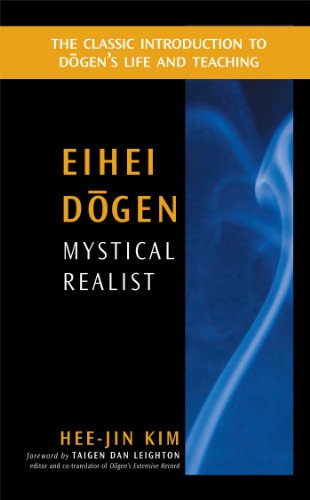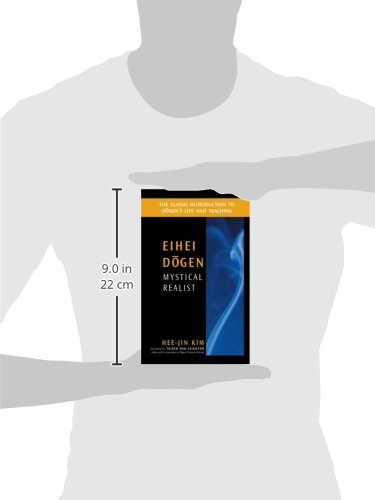Customer Services
Copyright © 2025 Desertcart Holdings Limited



Full description not available
J**Y
Sadly, this book couldn't make Dogen's metaphysical philosophy intelligible to this reader!
It's not the author's fault that he couldn't make Dogen's metaphysical philosophy intelligible to the reader; at least, not this reader.Dogen is notoriously difficult and this book shows why. Even with the best of wills, the author just couldn't find a way to communicate the uncommunicable.
J**N
but I thought this was a good introduction to his life and thought
I'm fairly new to Dogen, but I thought this was a good introduction to his life and thought. I've practiced Zen over twenty years and found it compatible but challenging. It did open my eyes to many things about Zen and Zen practice. It gets very philosophical and was hard for me to follow at times though. Without a solid Zen practice though I doubt a person could necessarily make heads or tails of what's being conveyed. Gassho...
U**E
Good, complicated
It's a good study, just don't buy if you need an "easy intro to Dogen" - that's not the book you're looking for. It's scholastic and rather advanced.
M**N
Five stars for much history
Very informative. Historical background revealing where Dogen came from in his thought process and practical position. More doctrine and dogma than a course in Buddhism. Excellent work.
S**O
Five Stars
Well written, and well documented !
H**U
An engaging study
Kim's work has won the praise of many, not least Robert Aitken Roshi, an American with a lifetime's experience of Zen training. In his foreword to the third edition, Aitken Roshi stated: "this revised edition . . .now includes many new translations and studies of Dogen, and thus it is most welcome. Dogen wrote at the outermost edge of human communication, touching with every sentence such mysteries as self and other, self and non-self, meditation and realization, the temporal and the timeless, forms and the void.@He wrote of the attitude necessary for understanding, of the practice required. . .of the various insights that emerge, and of the many pitfalls. He did not generally write for beginners - most of his points require very careful study and a few of them elude almost everybody. These challenges are compounded by his creative use of the Japanese language. It has been said that he wrote in "Dogenese," for he made verbs of nouns, nouns of verbs, created new metaphors, and manipulated old sayings to present his particular understanding. . . " Prof. Kim's study has been based on a careful reading of Dogen's chosen idioms. He has endeavoured to amplify Dogen's understanding of 'do-ri' - or 'reason of the way.' Kim is keen to show that Dogen's use of Zen language is not merely provisional or instrumental, but embodies a 'realisational' dimension. This is exemplified in the notion of the 'genjo-koan' or koan realised in the present, which is to say, actualised in every day activity. In this way, Kim endeavours to show that Dogen's Zen culminates in ' the great way of total exertion' (gujin no daido) or the total actualisation of practice as realization. Kim is a foremost interpreter of Dogen's thought - and, as such, this book deserves a place in every Buddhist library. My only reservation about this study, is that it might have made better sense of the question of how the so-called 'instrumentalist' aspect of koan practice relates to the 'realizational' aspect. Quite rightly, Kim is at pains to point out that accounts of Zen which stress the 'instrumentalist' view of koan practice - and that alone, are one sided, and he has therefore endeavoured to illustrate a different perspective. However, without reflection, we might be left to conclude that Rinzai Zen favours the 'instrumentalist' view - and Soto, the 'realizational' view. Kim knows better, and indeed, in places (p. 165), he has cited certain remarks from Dogen, which concede that the term 'genjo-koan' originated with Engo - a Rinzai master of the Sung, evidently meaning that Rinzai practitioners have appreciated the 'realizational' aspect. As such, the critical references to (Dai-e) Ta-hui which appear elsewhere in the book, seem strangely out of tenor with this fact. Yuan-wu (Engo) was Ta-hui's teacher, and the latter must surely have known of his master's references to the genjo-koan. Conversely, much as we might identify Dogen's Zen with 'shikantaza' (just-sitting), playing down the instrumentalist approach, Dogen also had his experience of 'casting off mind and body' (shinjindatsuraku) - a breakthrough experience more or less akin to that realised by Rinzai followers. Perhaps Prof. Kim will enlighten us on this unresolved problem, at some future point.
T**R
The Most Essential Work on Dogen Available in English
If I had to choose between Hee-Jin Kim's Eihei Dogen: Mystical Realist and all the other books on Dogen Zenji, author of Zen masterpiece Shobogenzo, I would not need to ponder--I would choose Mystical Realist.The only other books in English that come close to Mystical Realist in their importance for understanding and appreciating Dogen and his writings are Hee-Jin Kim's two other masterful explorations of this seminal thirteenth century Zen master. These are, Dr. Kim's most recent book Dogen on Meditation and Thinking: His View on Zen, and his 1985 publication, Flowers of Emptiness: Selections From Dogen's Shobogenzo.Ever since its original publication in 1975 (then titled: Dogen Kigen--Mystical Realist) Professor Kim's Eihei Dogen: Mystical Realist has remained at the top of the list as the definitive English language book on the founder of Soto Zen in Japan and his works. This work has undergone several revisions (the latest in 2004) that have allowed Hee-Jin Kim to improve upon his original message. These revisions have allowed Kim to expand upon his ideas as they have been refined through the years, as well as to make corrections to the translations and keep the book current with ongoing scholarship.While the revisions have improved the overall flow of his message, and improved the book's readability, its central teachings have stood firmly throughout. The insight that Kim offered us on Eihei Dogen and his work has remained essential unchanged. Like Master Dogen's own work, Kim's Mystical Realist is as vital and lively today as it was when it was originally published. This book is truly an extraordinary achievement, and as of all Kim's work, an essential text for students, not only of Dogen, or even Zen, but for anyone interested in exploring the human condition and its potential for actualization.
S**E
Outstanding on Zen and Dogen
This is an outstanding text that debunks many of the new-age and Californiacted versions of Zen - not to mention the plethora of internet sites claiming expertise on the subject - particularly the ant-intellectual and intuition-only tendencies that are so common among modern students. More later...
F**E
Livro muito bom
Um ótimo livro. Porém é muito acadêmico (não recomendado para iniciantes). Leitura complicada, que depende de muita atenção, conhecimento prévio e frequente releitura de trechos anteriores. Para quem gosta de conhecimento e análises filosóficas, recomendado.
M**S
Excellent Single Volume Look at Dogen
Eihei Dogen (1200-1253), the founder of the Japanese branch of the Soto Zen Buddhist school, is considered one of the world's most remarkable religious philosophers. Eihei Dogen: Mystical Realist is a comprehensive introduction to the genius of this brilliant thinker. This thirteenth-century figure has much to teach us all--for the questions that drove him have always been at the heart of Buddhist practice. An ambitious book, Eihei Dogen: Mystical Realist is both intellectually challenging and enjoyable to read."Dogen is no easy read - fortunately Kim's book, itself a polished gem, expertly guides a reader into what is simultaneously rich and playful in Dogen's vision." William LaFleur."While there have been many developments in the historical and philosophical understanding of Dogen's contribution to Zen Buddhism, Kim's work still stands out for the depth and clarity of its elucidation of Dogen as a religious thinker and practitioner." Mark Unno."This book is an excellent comprehensive introduction to Dogen's massive corpus of intricate writings as well as to his elegantly simple yet profound practice. It stands as the best overall general introduction to Dogen's teaching." Taigen Dan Leighton."Down the years and through its earlier editions, it was always to Dr.Kim's book that I turned first in any matter relating to Dogen." Robert Aitken.Also by Hee-Jin Kim is Dogen on Meditation and Thinking , an excellent follow up piece to this work. I highly recommend both. Dogen on Meditation and Thinking
T**I
Difficult, profound and life-giving
A difficult read and perhaps that is not just a judgement upon my own brain cells! I would have to say that for one like myself who has found that a lot of religion is simply the betrayal of THIS world for some imagined "other", the attraction of Mahayana Buddhism's identification of samsara ( our world of birth and death ) with nirvana has always held the potential to heal and redeem. Dogen, according to Mr Kim's exposition, taught such. The text must be read slowly and carefully - at least, so I found. Yet the text rewards such care and attention. Though myself a Pure Land Buddhist ( or as Mr Kim writes, "Pure Realm Buddhism" ) and Mr Kim draws distinctions between the thought of Dogen and Shinran ( one of the "fathers" of Japanese Pure Land Buddhism ) I found some passages deeply transformative - or as transformative as words/philosophy can be. Also extraordinarily "modern". One of the very best books I have ever read. Thank you.
K**L
Einer der besten Einführungen zu Dogens Denken
Wer plant, sich mit dem Denken des einflussreichen japanischen Zen-Meisters Dogen-Zenji zu beschäftigen, sollte nicht gleich zu seinem schwer verdaulichen Hauptwerk, dem Shobogenzo, greifen, sondern sich diese geniale Arbeit von Prof. Kim zu Gemüte führen. Leider ist diese gut verständliche Einführung noch nicht ins Deutsche übersetzt worden. (Deutsche Verlage, die sich auf Zen-Literatur spezialisieren, ignorieren diese wichtige, dem Verständnis zuträgliche Arbeit nach wie vor). Zen-Interessierte, die vor dem Englischen keine Berührungsängste haben, empfehle ich auch noch zwei andere Arbeiten von Hee-Jin Kim: Dogen on Meditation and Thinking: His View on Zen, und Flowers of Emptiness: Selections From Dogen's Shobogenzo.
A**R
Impeccable brand new condition - good Intro' by the author bringing the research up to ...
Impeccable brand new condition - good Intro' by the author bringing the research up to date since it was written 40 years ago, with references in different languages.
Trustpilot
3 days ago
1 month ago
2 weeks ago
2 weeks ago